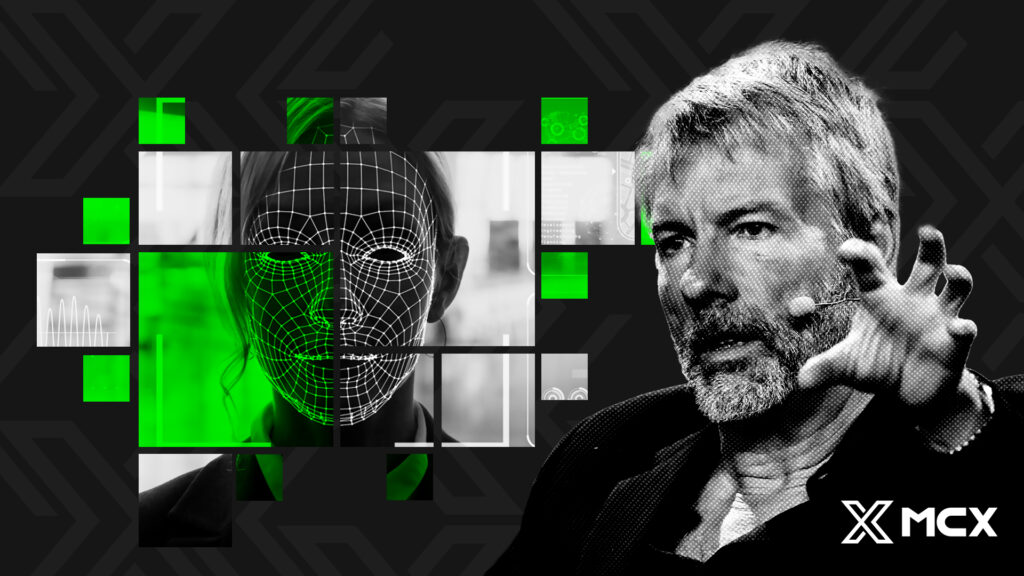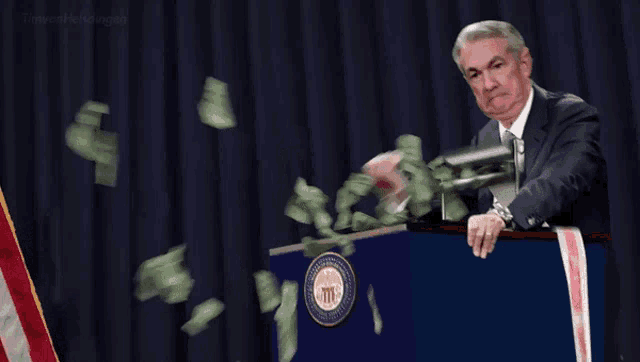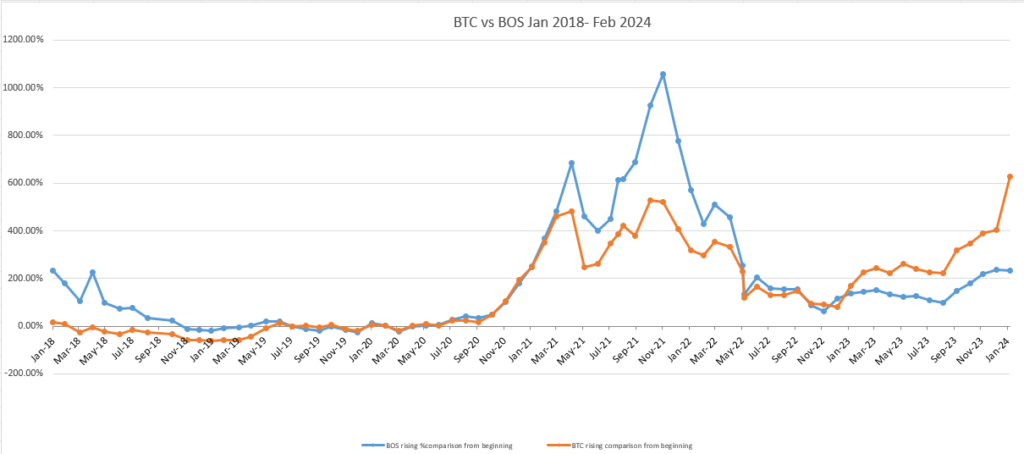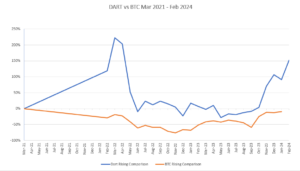Bostoncoin update Feb-March 2024

Weirdest & strangest newsletter ever
This is the weirdest and strangest newsletter I have written in some nine years, and not just because I am typing this sitting on a trans-national train, journeying some 1000 kilometers through Vietnam.
I have been adjusting to the schedule of losing 10-15 hours in transit, adapting to the timezone and internet, and finding myself in a strange city, filled with adventure, culture, mystery, tradition and wonder.
Apparently, whilst my devices were in flight mode, the crypto markets have been going off like fireworks at Chinese New Year.
OK, so we had seen some indicators that markets were moving, with the entry of Wall Street into crypto back in January, but this was a known quantity. Whilst the entry of Wall Street was forecast as an inevitability, we did not have a firm January 10 kickoff until the SEC basically crumbled in November last year.
Those who have been in crypto for more than five years will know about “the halvening” that occurs with Bitcoin every four years, and how the halving of new Bitcoin supply usually results in the price more than doubling. This too, is a known quantity for many. We have seen this several times in the past fifteen years.
What seems to be weird and strange this time around is the level of maturity in the market, and in the market players. Crypto has long been a club for young boys, and meme coins that did not involve dogs often revolved around techno-jargon, or juvenile jokes about body parts or bodily functions. In 2024, not so much.
Leading up to the previous halving in 2020, we had celebrities, ‘finfluencers’ and charismatic cult-leaders, alongside bobble-heads on TikTok and Youtube, promising people the world for a small fee.
Fortunately, the swamp seems to have been drained of these parasites. Kim Kardashian was fined more than double the amount she received for promoting a scam coin. Floyd Mayweather was shut down for the same crime. Schemes (scams) such as Bitconnect, crypto-MLM and Ponzis and pyramids that once flourished like weeds, seem to have died down to a mere handful.
We have witnessed the arrest of Sam Bankman-Fried for his embezzling from FTX, and Interpol chasing down Do Kwan for his Terra / Luna collapse. Alex Mashinsky has been forced to give up funds taken from Celsius and investors have received almost half their money back.
Celebrity Youtube influencer “BitBoy” Ben Armstrong had a very public meltdown, and the guy who made a living from showing off his expensive toys was reduced to begging for money to pay his lawyers. Call it karma or call it schadenfreude, we are happy to see the dishonest players taken down. The surprising thing about it, is the vacuum does not seem to have been filled.
Any good historian knows that when a king is killed, the killer becomes king. Almost a century ago, George Orwell’s “Animal Farm” parodied the communists who overthrew the rulers and preached equality but made themselves into neo-riche royalty. Now that the corrupt kings and queens of crypto-influencing have been almost wiped out, who will take their place?
It feels weird. I am guessing that there may be historical precedents for the uneasy feeling of restrained relaxation that one has when the old villain is gone, and you are unsure when or if the next will appear. Were citizens uneasy after the death of Billy the Kid or Bonnie and Clyde? If most of the big-name celebrity thieves are gone, do new ones step in to take their place? Do we just have golden days with no scams? what happens next?
I am hoping that once-bitten now-wiser investors are reasonably gun-shy of celebrities, particularly those who have almost zero experience with crypto or investing. Perhaps the power vacuum can in fact be filled by the people, who do not really need kings or queens, as we can all be capitalists, communally. Perhaps instead of blindly following a celebrity into a scam, we can all learn to do our own research. For those who have time to learn, point your nose to www.Cryllionaire.com. For those who do not have time to do their own research, there is always Bostoncoin, the world’s first and arguably best cryptocurrency mutual fund 🙂 Tell your friends 🙂
Meanwhile, keep an eye out for the AI scams that do not just copy celebrities, but can copy friends, family and workmates. Be alert but not alarmed. Just as banks and crypto exchanges insist on two-factor authentication (2FA), feel free to use another authentication method if you seem to receive a message from a friend or loved one who needs you to send money. If you receive a text message, make a phone call. Follow up an email with a video call. Double check, and be smart, because even video calls can be faked (just not 100% perfectly).

Is this the world’s best scam?
The date: February 10, 2024. The Scene: A large multinational company with HQ in Europe and a trading desk in Hong Kong. An email comes from the boss in Europe to the representative in Hong Kong: “Urgent: please pay this supplier $25 million, top secret.”
The Hong Kong representative thinks there is a chance that the boss may have had their email hacked, so they email back and say, “Hey, do you mind jumping on a quick video call?”
The boss agrees. Five people are on the video call, including the boss, the Hong Kong rep, the company treasurer and two other higher-ups. The boss on the Zoom call says to pay the supplier and keep it secret.
The Hong Kong representative is now satisfied, and makes the $25 million transfer…
… to the scammers!
Not only was the email hacked, but the scammers had been secretly recording the company’s video calls. They used hours of video footage and “deepfake” video technology to make a pretend boss say what they wanted.
DANG! You lose $25 million here and $25 million there and all of a sudden it adds up to serious money…
How to protect yourself from video call scams
Eye Movements
How the individual’s eyes move is usually a dead giveaway. If their eyes don’t blink and shift naturally as one would during a video call, you need to be careful.
Unnatural Features
Along the same line, look out for strange signs like abnormal skin tones, hair that’s weirdly frizzy or textured, and blurring around certain parts of their body or face.
Glasses Reflections
If the person you’re calling is wearing glasses, look at how the light interacts with their lenses: the amount of glare present or absence of plausible refelctions. That’s because deepfake technology is not yet able to fully recreate the natural physics of light.
Awkward Audio
Although deepfake technology can recreate voices with an impressive level of accuracy, pay attention to how the audio syncs up with the individual’s lip movements. If it feels like a poorly-dubbed Netflix special, aim to verify the person’s identity another way.
It’s not just live video calls than can be deepfaked. Scammers can also use #deepfake technology to create convincing YouTube videos of celebrities, famous investors or advisers. They often promise you ridiculously good returns, if you send them a little bit of money. Watch the eyes, the lips, the glasses, the skin. Do not send someone any funds, without several forms of verification. Nobody will give you double your money with zero risk if you just send them some funds first.
Please share this story as it may save a friend from losing a lot of money. Your scammed friend then has to come and borrow food money from you, and it gets awkward. It’s better to share the information, save the drama, and protect the friendship.
And now for some light-hearted news…

Fun with investment names
By now you may be vaguely aware that there are a bunch of Bitcoin ETFs available on the market. Each of the funds has its own name and ticker code, just like the stock market.
For example, the ticker code for stock in Commonwealth Bank of Australia is its initials, CBA. For Westpac Banking Corporation, its ticker is its initials, WBC. The ticker codes for stock in Telstra and Tesla are shortened versions of their names, eg. TLS and TESL
Blackrock named its Bitcoin fund in line with their iShares range, all starting with the letter I, so the Blackrock Bitcoin fund has the ticker IBIT. Grayscale went equally mundane, with the Grayscale Bitcoin Trust being GBTC.
Vaneck decided to have a bit more fun with their ticker and made it HODL, a long-known typo for “hold” and a phrase often used in crypto circles.
Not to be outdone, investment manager Valkyrie used the 2020 meme “Money Printer goes BRRR”. This joke referred to the devaluation of the USD by excess Fed stimulus cash printing. The Valkyrie Bitcoin fund ticker code is BRRR, so we know exactly how they feel and who they are.
Aside from having a great sense of humour, the Valkyrie team must love Bitcoin a lot. They are the first in the world to launch a “double Bitcoin” fund. This fund uses leverage to double your returns.
WARNING: leverage can double your returns on the way up, so a 10% rise in price will give you 20%. HOWEVER: leverage also doubles on the way down. A 20% fall in price will give you a 40% loss. Be careful.

How did we go this month?
A rising tide lifts all boats, as Warren Buffett says, but some more than others. Wall Street firms have piled into Bitcoin, driving the price up over 30% during February alone (less some drops as profits are taken). Meanwhile, some coins that deliver valuable solutions to real-world problems have risen even more.
In the Bostoncoin portfolio
Injective up 822%
Solana up 624%
Chainlink up 264%
As at Feb 29 2024
BOS NAV AUD 91.034865345
BOS Price AUD 100.138518795
BOS NAV USD 59.8913597725
BOS Price USD 65.8804957498

For the DARTcoin portfolio
Akash Network up 916%
Render up 465%
ThorChain up 332%
As at Feb 29 2024
DART NAV AUD 228.8799586196
DART Price AUD 251.7679544816
DART NAV USD 149.11741
DART Price USD 164.029151

As always, stay vigilant. Even though you can make gains of 100% or more in crypto far more quickly than in the stockmarket, it only takes a split second to lose it all to a scam.
We use antivirus software to prevent payload hackers, VPN to stymie geolocation hackers, various firewalls and other security measures. Some of these products you can get for free or for under $1 per day (just make sure to get them from a reliable source! Check reviews on Play Store, App Store and TrustPilot.com).
If you have more than $1000 in cryptocurrency on an exchange or hot wallet (on a phone, PC or other device connected to the internet), it may be a wise move to have a cold wallet (a device that is *not* connected to the internet).
We like Ledger, but Trezor and other companies also supply a great cold wallet. Be sure to buy direct from the manufacturer, as cheaper second-hand items may have been tampered with, and you could introduce viruses or money drains to your computer. When buying a cold wallet, be sure that you are opening a hermetically-sealed box with a hologram to ensure its veracity. To pick up a Ledger direct from the source and receive a bonus $25 in free Bitcoin, click here.
Stay safe, make the commitment to share this newsletter and its information with three friends this month, and create your own crypto-bubble circle of trust. This week, crypto helped me to set up an inheritance for my grandchildren, showed an 82-year-old woman that her small amount of 2017 crypto is now a decent chunk, and helped me navigate the vastness of Vietnam. Where will your crypto journey take you?
JB
